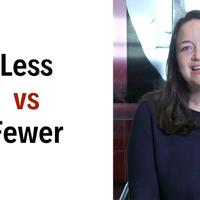Less vs Fewer: What's the difference? English In A Minute - YouTube
||더 적은||||||||
||meno||||||||
menos|||qué||diferencia|||||
Weniger vs. Weniger: Was ist der Unterschied? Englisch in einer Minute - YouTube
Menos vs Menos: ¿Cuál es la diferencia? Inglés en un minuto - YouTube
Moins ou moins : Quelle est la différence ? L'anglais en une minute - YouTube
少ないか少ないか:何が違うの?1分でわかる英語 - YouTube
Mniej vs Mniej: Jaka jest różnica? Angielski w minutę - YouTube
Menos vs Menos: Qual é a diferença? Inglês num minuto - YouTube
Меньше против меньше: В чем разница? Английский за минуту - YouTube
Daha Az vs Daha Az: Aradaki fark nedir? Bir Dakikada İngilizce - YouTube
更少与更少:有什么区别?一分钟英语 - YouTube
Hi, I'm Sam from BBC Learning English
and today we're going to look at the difference between
今日はその違いを見てみよう。
'less' and 'fewer' when comparing things.
||||비교할|
||||comparando|
物事を比較するときの「より少ない」と「より少ない」。
It's actually very simple.
実はとても簡単なことなんだ。
We use 'fewer' with countable nouns
||少ない|||
数えられる名詞には「より少ない」を使う
and 'less' with uncountable nouns.
と「less」は不可算名詞で使われる。
But even native speakers get this wrong,
|||화자|||
|さえ|||||
しかし、ネイティブ・スピーカーでさえ、これは間違っている、
so let's have a look at some examples.
では、いくつかの例を見てみよう。
I moved recently, and comparing my old area
||최근에|||||
||||比較して|||
私は最近引っ越しをした。
to my new neighbourhood, I can say:
|||동네|||
|||quartiere|||
新しい隣人に対して、私はこう言える:
There are fewer restaurants and fewer cafes
|||식당|||카페
レストランもカフェも少ない
and there is less traffic and less pollution.
||||교통|||오염
|||||||汚染
交通量も少なく、公害も少ない。
Cafes and restaurants are countable nouns.
カフェやレストランは可算名詞である。
You can count them on your fingers
指で数えることができる
and you can make them plural, so we use 'fewer'.
|||||複数形||||
複数形にすることもできるので、私たちは "fewer "を使っている。
Pollution and traffic are uncountable nouns.
汚染と交通は不可算名詞である。
You can't count them on your fingers
Ti||||||
and you can't make them plural, so we use 'less'.
複数形にすることはできないので、「less」を使う。

